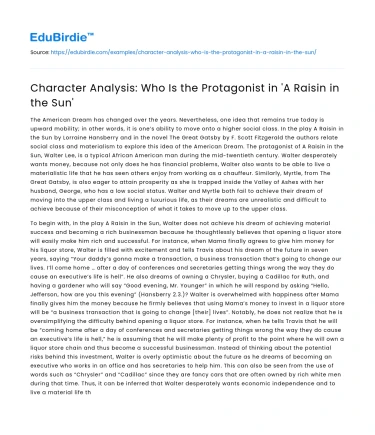The American Dream has changed over the years. Nevertheless, one idea that remains true today is upward mobility; in other words, it is one’s ability to move onto a higher social class. In the play A Raisin in the Sun by Lorraine Hansberry and in the novel The Great Gatsby by F. Scott Fitzgerald the authors relate social class and materialism to explore this idea of the American Dream. The protagonist of A Raisin in the Sun, Walter Lee, is a typical African American man during the mid-twentieth century. Walter desperately wants money, because not only does he has financial problems, Walter also wants to be able to live a materialistic life that he has seen others enjoy from working as a chauffeur. Similarly, Myrtle, from The Great Gatsby, is also eager to attain prosperity as she is trapped inside the Valley of Ashes with her husband, George, who has a low social status. Walter and Myrtle both fail to achieve their dream of moving into the upper class and living a luxurious life, as their dreams are unrealistic and difficult to achieve because of their misconception of what it takes to move up to the upper class.
To begin with, in the play A Raisin in the Sun, Walter does not achieve his dream of achieving material success and becoming a rich businessman because he thoughtlessly believes that opening a liquor store will easily make him rich and successful. For instance, when Mama finally agrees to give him money for his liquor store, Walter is filled with excitement and tells Travis about his dream of the future in seven years, saying “Your daddy’s gonna make a transaction, a business transaction that’s going to change our lives. I’ll come home … after a day of conferences and secretaries getting things wrong the way they do cause an executive’s life is hell”. He also dreams of owning a Chrysler, buying a Cadillac for Ruth, and having a gardener who will say “Good evening, Mr. Younger” in which he will respond by asking “Hello, Jefferson, how are you this evening” (Hansberry 2.3.)? Walter is overwhelmed with happiness after Mama finally gives him the money because he firmly believes that using Mama’s money to invest in a liquor store will be “a business transaction that is going to change [their] lives”. Notably, he does not realize that he is oversimplifying the difficulty behind opening a liquor store. For instance, when he tells Travis that he will be “coming home after a day of conferences and secretaries getting things wrong the way they do cause an executive’s life is hell,” he is assuming that he will make plenty of profit to the point where he will own a liquor store chain and thus become a successful businessman. Instead of thinking about the potential risks behind this investment, Walter is overly optimistic about the future as he dreams of becoming an executive who works in an office and has secretaries to help him. This can also be seen from the use of words such as “Chrysler” and “Cadillac” since they are fancy cars that are often owned by rich white men during that time. Thus, it can be inferred that Walter desperately wants economic independence and to live a material life that is similar to the life of an upper-class white man during the 1950s. Similarly, his imagined conversation with a gardener also reveals that he wants to have high social status and be looked up to by others. However, his naivety about the liquor store investment and lack of consideration demonstrates how his dream is unrealistic and are contributing factors to his failure of achieving his dream. This is revealed later in the play after Walter’s friend Bobo tells him that their friend Willy Harris has run off with all of the money that Walter invested in the liquor store. Walter becomes upset and tells Mama, “[Life] is all divided up… Between the takers and the ‘token’...People like Willy Harris, don’t ever get ‘token’.” [The rest of us do because] “we get to looking ‘round for the right and the wrong; and … trying to figure out about the wrong and the right of things all the time…And all the time, man, them takers is out there operating, just taking and taking” (Hansberry 3.1.). At this point, Walter is forced to give up his dream because Willy Harris ran off with the money. Exasperated by Willy’s action, Walter tries to provide a justification for his failure in achieving his dream by saying that the world is unjust. While people like him “[try] to figure out … the right and wrong of things all the time”, “Takers” like Willy Harris are the exact opposite. They “[are] out there operating” and always taking advantage of the “token”. In other words, Walter is trying to say that he is unable to achieve his dream because he cares about moral values, but in this unjust world, only the “takers” who have no moral integrity can succeed. However, as Walter blames the “takers” for his failure, he dismisses the fact that it is also his fault. Thinking that the liquor store will be a deemed success, Walter willingly gives Willy all of the insurance money and fully trusts him to take care of this investment thus making him the “taker”. Moreover, Walter has no alternative plan for his dream, which is why he finds it hard to accept this failure so he blames the world and Willy Harris for it. All in all, Walter fails to achieve his dream of becoming a successful businessman and living a materialistic life; furthermore, he does not realize that his dream is hard to achieve, especially with his unrealistic optimism.
Save your time!
We can take care of your essay
- Proper editing and formatting
- Free revision, title page, and bibliography
- Flexible prices and money-back guarantee






 Stuck on your essay?
Stuck on your essay?

